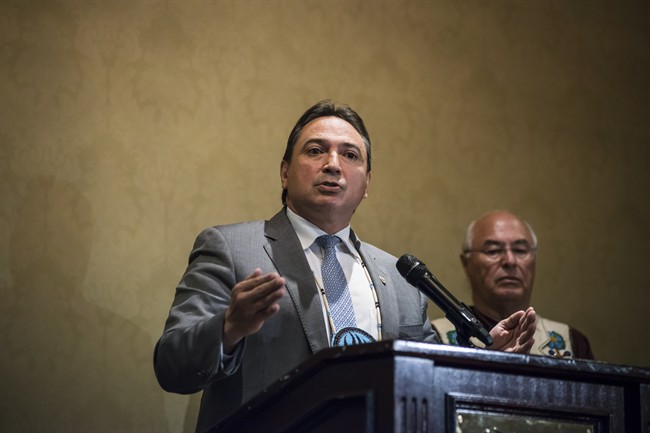Once again, Canada’s First Ministers have gathered for their annual summer Council of the Federation, being held this year in Edmonton. The agenda includes trade and Trump, pot and the provinces, infrastructure and investment. It also featured a meeting with representatives of five national Indigenous organizations to discuss issues of concern to their communities.

At least it did until three of the five organizations pulled out on the first day. On Monday morning, Assembly of First Nations National Chief Perry Bellegarde, Inuit Tapiriit Kanatami President Natan Obed and Métis Nation President Clément Chartier decided not to attend, citing a “number of concerns about the structuring” of the meeting.
WATCH BELOW: 3 Indigenous leaders boycott meeting with premiers in Edmonton

In a news conference in Toronto, Bellegarde stated that “over the past year, it’s become apparent in some federal and provincial forums, there’s a bit of a push to try to exclude or limit Indigenous peoples’ involvement in a very meaningful, substantive way.”
For the average non-Indigenous Canadian, this probably is a little surprising, considering that the current federal government came to office on a promise of “a renewed, nation-to-nation relationship with Indigenous Peoples based on recognition, rights, respect, co-operation and partnership.” Since then, however, Indigenous leaders have grown increasingly angry over serial broken promises and failed initiatives. These include the Trudeau government’s refusal to adopt the United Nations Declaration on the Rights of Indigenous Peoples into Canadian law, the approval of two major oil pipelines and the rolling meltdown of the inquiry into murdered and missing Indigenous women and girls.
- ‘Shock and disbelief’ after Manitoba school trustee’s Indigenous comments
- Canadian man dies during Texas Ironman event. His widow wants answers as to why
- Several baby products have been recalled by Health Canada. Here’s the list
- ‘Sciatica was gone’: hospital performs robot-assisted spinal surgery in Canadian first
None of this is the provinces’ fault, of course. But dashed expectations at the federal level have contributed to a simmering frustration with political elites at all levels, and a sense that the “nation-to-nation” concept is turning out to be more empty words. “We’re not ethnic minorities,” Bellegarde said. “We are Indigenous peoples, we have the right to self-determination. Because we have our own lands, we have our own laws, we have our own languages, we have our own identifiable peoples and we have our own identifiable forms of government. So that inherent right must be respected.”
READ MORE: Notley to keep talking pipelines with BC despite Horgan’s potential absence at premiers meeting
Respected, yes — but they need to be defined as well. And this is where the demands of the three Indigenous leaders overreach in terms of this particular meeting.
A First Ministers meeting, by definition, is a meeting of people who have been elected to govern a province or territory. To grant full participation to those who have not obtained their office by popular suffrage and uniform standards would change the notion of the meeting entirely, and open the door to any group which considers itself worthy of that status. The prime minister himself isn’t even entitled to attend, nor is he a member of the council.
Council membership also is not a necessary result of respecting the right to self-determination. That right is an inherent one — it can’t be taken away, but there is no single blueprint for its expression. Quebec, for example, has long claimed the right to self-determination, and two governments tried to exercise this right through referenda which proposed taking Quebec out of Canada. Neither vote was successful, though the 1995 referendum came mighty close.
Instead, over the past few decades, Quebecers have asserted their right to self-determination while remaining within the federation: they have a separate immigration deal with Ottawa, a distinct pension system, a separate tax regime and, for over a century, a distinct legal system. Quebec may not be a distinct society in the constitutional sense, but it is in the practical one.
At the same time, the province still abides by the federal Charter of Rights and Freedoms; its government has the same jurisdiction as other provincial governments and its citizens are bound by the same criminal laws as other Canadians.
READ MORE: Couillard hopes to discuss constitutional initiative with provincial counterparts
In other words, it is possible to determine oneself within limits. But you need to accept the structure that underpins those limits, or else the entire process is a non-starter.
Ironically, Trudeau himself articulated this in his defence of his decision to approve oil pipelines in December 2016:
“ … (W)e’re a country of rule of law. We’re a country where we have processes for consultations. We have regular elections. We have ways of protesting to make your feelings heard, and that is all par for the course and that will happen … And that is something that is important in our national discourse as a country.”
The prime minister is right on that point, but if he’s serious about pursuing a nation-to-nation relationship, he has to be clear on what that means. He can’t simply promise to repair the ills of the past without setting a clear blueprint for the future.
At the same time, First Nations will have to come to a consensus on what they can accept in terms of self-governance and self-determination. And there are some non-negotiables — the Charter of Rights being a prime example. Why should women and LGBTQ individuals not be able to avail themselves of Charter protections should they face discrimination, whether they’re First Nations or not?
There is a crying need for greater Indigenous participation in our politics, through more Indigenous Canadians running for office and serving on bodies appointed by various levels of government. Creating arbitrary equivalencies between titles and positions is not the answer. Neither are hollow promises.
Tasha Kheiriddin can be heard between noon and 2 p.m. ET on Toronto Talk Radio AM640. She’s also a columnist with Global News and iPolitics.ca, where this piece first appeared.








Comments